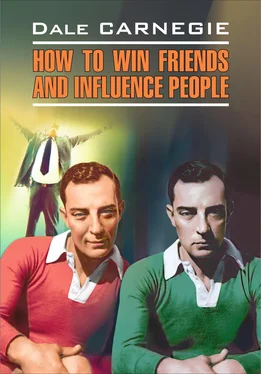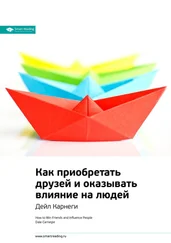It helped me improve my ability to make decisions – and it aided me enormously in all my contacts with people. I cannot recommend it too highly.”
Why not use a similar system to check up on your application of the principles discussed in this book? If you do, two things will result.
First, you will find yourself engaged in an educational process that is both intriguing and priceless.
Second, you will find that your ability to meet and deal with people will grow enormously.
9. You will find at the end of this book several blank pages on which you should record your triumphs in the application of these principles. Be specific. Give names, dates, results. Keeping such a record will inspire you to greater efforts; and how fascinating these entries will be when you chance upon them some evening years from now!
In order to get the most out of this book:
a. Develop a deep, driving desire to master the principles of human relations.
b. Read each chapter twice before going on to the next one.
c. As you read, stop frequently to ask yourself how you can apply each suggestion.
d. Underscore each important idea.
e. Review this book each month.
f. Apply these principles at every opportunity. Use this volume as a working handbook to help you solve your daily problems.
g. Make a lively game out of your learning by offering some friend a dime or a dollar every time he or she catches you violating one of these principles.
h. Check up each week on the progress you are making. Ask yourself what mistakes you have made, what improvement, what lessons you have learned for the future.
i. Keep notes in the back of this book showing how and when you have applied these principles.
Part one
Fundamental techniques in handling people
I
“If you want to gather honey, don’t kick over the beehive”
On May 7, 1931, the most sensational manhunt New York City had ever known had come to its climax. After weeks of search, “Two Gun” Crowley – the killer, the gunman who didn’t smoke or drink – was at bay, trapped in his sweetheart’s apartment on West End Avenue.
One hundred and fifty policemen and detectives laid siege to his top-floor hideaway. They chopped holes in the roof; they tried to smoke out Crowley, the “cop killer,” with tear gas. Then they mounted their machine guns on surrounding buildings, and for more than an hour one of New York’s fine residential areas reverberated with the crack of pistol fire and the rat-tat-tat of machine guns. Crowley, crouching behind an overstaffed chair, fired incessantly at the police. Ten thousand excited people watched the battle. Nothing like it had ever been seen before on the sidewalks of New York.
When Crowley was captured. Police Commissioner E. P. Mulrooney declared that the two-gun desperado was one of the most dangerous criminals ever encountered in the history of New York. “He will kill,” said the Commissioner, “at the drop of a feather.”
But how did “Two Gun” Crowley regard himself? We know, because while the police were firing into his apartment, he wrote a letter addressed “To whom it may concern.” And, as he wrote, the Mood flowing from his wounds left a crimson trail on the paper. In his letter Crowley said: “Under my coat is a weary heart, but a kind one – one that would do nobody any harm.”
A short time before this, Crowley had been having a necking party with his girl friend on a country road out on Long Island. Suddenly a policeman walked up to the car and said: “Let me see your license.”
Without saying a word, Crowley drew his gun and cut the policeman down with a shower of lead. As the dying officer fell, Crowley leaped out of the car, grabbed the officer’s revolver, and fired another bullet into the prostrate body. And that was the killer who said: “Under my coat is a weary heart, but a kind one – one that would do nobody any harm.”
Crowley was sentenced to the electric chair. When he arrived at the death house in Sing Sing [1]did he say, “This is what I get for killing people”? No, he said: “This is what I get for defending myself.”
The point of the story is this: “Two Gun” Crowley didn’t blame himself for anything.
Is that an unusual attitude among criminals? If you think so, listen to this:
“I have spent the best years of my life giving people the lighter pleasures, helping them have a good time, and all I get is abuse, the existence of a hunted man.”
That’s Al Capone speaking. Yes, America’s most notorious Public Enemy – the most sinister gang leader who ever shot up Chicago. Capone didn’t condemn himself. He actually regarded himself as a public benefactor – an unappreciated and misunderstood public benefactor.
And so did Dutch Schultz before he crumpled up under gangster bullets in Newark. Dutch Schultz, one of New York’s most notorious rats, said in a newspaper interview that he was a public benefactor. And he believed it.
I have had some interesting correspondence with Lewis Lawes, who was warden of New York’s infamous Sing Sing prison for many years, on this subject, and he declared that “few of the criminals in Sing Sing regard themselves as bad men. They are just as human as you and I. So they rationalize, they explain. They can tell you why they had to crack a safe or be quick on the trigger finger. Most of them attempt by a form of reasoning, fallacious or logical, to justify their antisocial acts even to themselves, consequently stoutly maintaining that they should never have been imprisoned at all.”
If Al Capone, “Two Gun” Crowley, Dutch Schultz, and the desperate men and women behind prison walls don’t blame themselves for anything – what about the people with whom you and I come in contact?
John Wanamaker, founder of the stores that bear his name, once confessed: “I learned thirty years ago that it is foolish to scold. I have enough trouble overcoming my own limitations without fretting over the fact that God has not seen fit to distribute evenly the gift of intelligence [2].”
Wanamaker learned this lesson early, but I personally had to blunder through this old world for a third of a century before it even began to dawn upon me that ninety-nine times out of a hundred, people don’t criticize themselves for anything, no matter how wrong it may be.
Criticism is futile because it puts a person on the defensive and usually makes him strive to justify himself. Criticism is dangerous, because it wounds a person’s precious pride, hurts his sense of importance, and arouses resentment.
B. F. Skinner, the world-famous psychologist, proved through his experiments that an animal rewarded for good behavior will learn much more rapidly and retain what it learns far more effectively than an animal punished for bad behavior. Later studies have shown that the same applies to humans. By criticizing, we do not make lasting changes and often incur resentment.
Hans Selye, another great psychologist, said, “As much as we thirst for approval, we dread condemnation.”
The resentment that criticism engenders can demoralize employees, family members and friends, and still not correct the situation that has been condemned.
George B. Johnston of Enid, Oklahoma, is the safety coordinator for an engineering company. One of his responsibilities is to see that employees wear their hard hats whenever they are on the j ob in the field. He reported that whenever he came across workers who were not wearing hard hats, he would tell them with a lot of authority of the regulation and that they must comply. As a result he would get sullen acceptance, and often after he left, the workers would remove the hats.
He decided to try a different approach. The next time he found some of the workers not wearing their hard hat, he asked if the hats were uncomfortable or did not fit properly. Then he reminded the men in a pleasant tone of voice that the hat was designed to protect them from injury and suggested that it always be worn on the job. The result was increased compliance with the regulation with no resentment or emotional upset.
Читать дальше
Конец ознакомительного отрывка
Купить книгу












